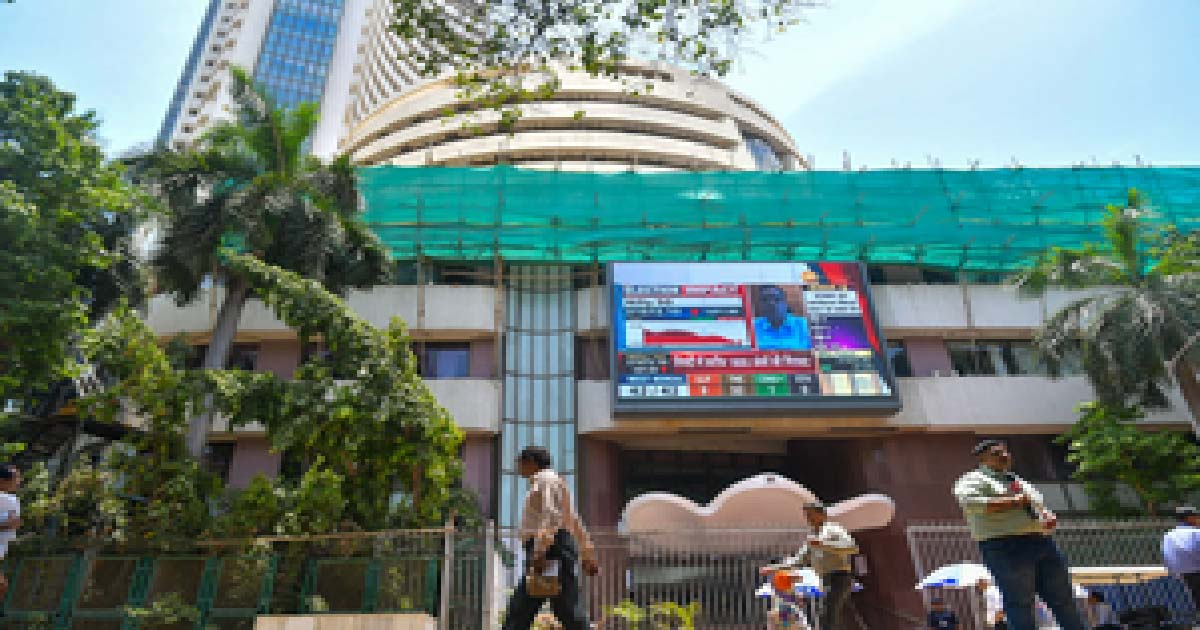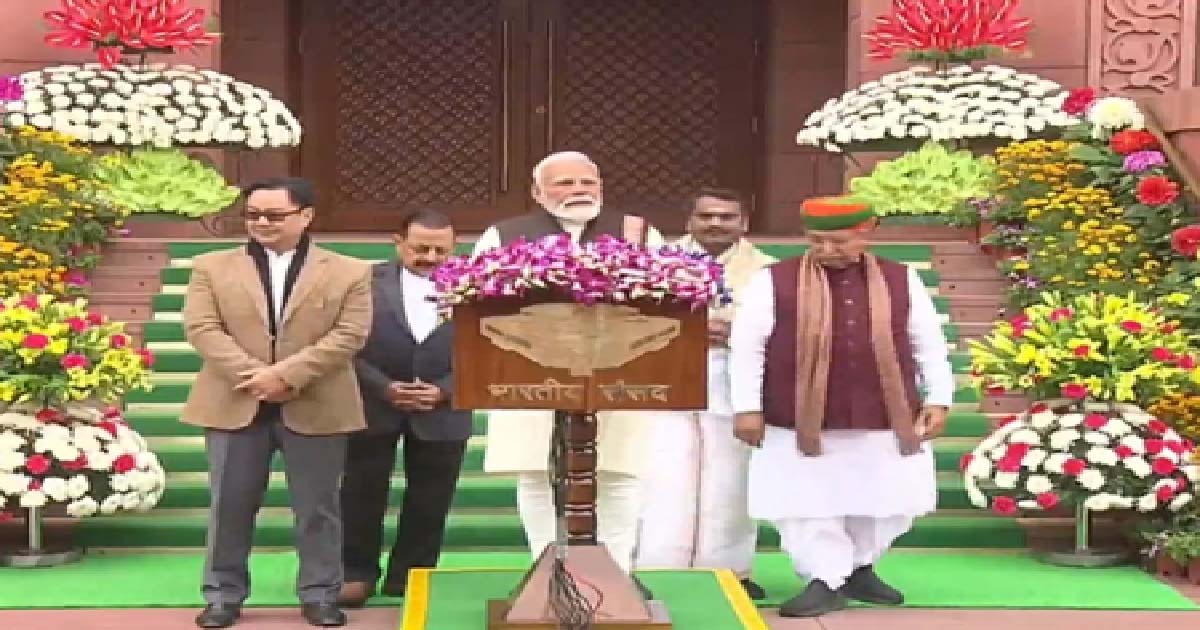Business
Indices ends sharply up, Sensex up over 1,500 points
Benchmark indices ended sharply up on Tuesday after falling sharply on Monday due to delivery-based buying by the FIIs and short covering in the F&O market, dealers said.
At close, Sensex ended 1,564.45 points, or 2.70 per cent, up at 59,537.07, and Nifty closed 445.40 points or 2.58 per cent up at 17,759.30. Nifty bank was up sharply at 3.29 per cent.
All the 30 stocks on the Sensex ended in green.
BSE LargeCap was up 2.59 per cent, BSE MidCap, and BSE SmallCap up 1.97 per cent, and 1.40 per cent, respectively. Bajaj Finserv, Bajaj Finance, IndusInd Bank, Tech Mahindra, and ICICI Bank were major gainers on the BSE.
“Today’s rebound indicates the domestic economy’s resilience in comparison to its global peers. Although the markets are currently at premium valuations, continued support from foreign investors aided domestic stocks to inch higher. Sectors in swing with the progress of the domestic economy should be able to do well compared to the rest,” said Vinod Nair, Head of Research at Geojit Financial Services.
Volumes on the NSE were the highest in more than a week. Among sectors, realty, power, banks, oil and gas, and auto indices rose the most. Broader market underperformed; however the advance decline ratio was sharply positive at 2.96:1.
Global stocks rose on Tuesday as investors sought bargains following two days of declines as Chinese authorities pledged to stimulate the world’s second-largest economy. China will step up measures to boost demand and stabilise employment and prices in the second half of the year to optimise economic outcomes, the country’s Finance Ministry said on Tuesday, as policymakers strive to prop up faltering growth.
“Nifty has nullified the bearish signals from the downgap created on the previous day and has filled that downgap. It has closed at the highest ever on monthly charts. It will now face resistance at 17965-17992 band while 17522-17623 band could offer support,” said Deepak Jasani, Head of Retail Research, HDFC Securities.
Business
Sensex, Nifty post losses as metal index plunges over 4 pc

Mumbai, Jan 30: The Indian equity markets traded lower early on Friday as the metal stocks plummeted under pressure.
As of 9.30 am, Sensex eased 525 points, or 0.64 per cent, to reach 82,040, and Nifty lost 159 points, or 0.63 per cent, to settle at 25,259.
Main broad-cap indices posted higher losses than the benchmark indices, as the Nifty Midcap 100 declined 0.81 per cent, and the Nifty Smallcap 100 lost 1.19 per cent.
All sectoral indices were trading in the red except FMCG, pharma and consumer durables. Nifty metal and IT were down 4.28 per cent and 1.41 per cent, respectively.
Immediate support lies at 25,250-25,300 zone, while resistance is anchored at 25,550–25,600 zone, market watchers said.
Analysts said that geopolitical issues continue to plague global trade with continuous threats of tariff weaponisation by US President Donald Trump. The spike in Brent crude to near $70 is a headwind for Indian macros in general and industries that use oil as inputs, in particular.
These headwinds are likely to be countered by the positive message from the Economic Survey that projects GDP growth of 6.8 per cent to 7.2 per cent growth in FY 27.
As India is headed for around 10 per cent nominal GDP growth in FY27, 15 to 17 per cent earnings growth can be expected in FY27, imparting resilience to the market.
From early 2027 onwards, India’s success in diversification of its export market away from the US will gain momentum with the India- EU trade deal getting implemented, they added.
Asia-Pacific markets mostly traded lower in the morning session after Trump said he will announce his choice for the next head of the US Federal Reserve on Friday.
In Asian markets, China’s Shanghai index eased 1.19 per cent, and Shenzhen lost 0.96 per cent, Japan’s Nikkei declined 0.35, and Hong Kong’s Hang Seng Index lost 1.66 per cent. South Korea’s Kospi added 0.59 per cent.
The US markets ended largely in the green overnight as Nasdaq lost 0.72 per cent. The S&P 500 eased 0.13 per cent, and the Dow gained 0.11 per cent.
On January 29, foreign institutional investors (FIIs) net sold equities worth Rs 394 crore, while domestic institutional investors (DIIs) were net buyers of equities worth Rs 2,634 crore.
Business
Sensex, Nifty trade lower weighed down by IT stocks

Mumbai, Jan 29: The Indian equity markets traded lower early on Thursday, tracking mixed global cues and weakness in IT stocks.
As of 9.30 am, Sensex eased 347 points, or 0.42 per cent, to reach 81,997, and Nifty lost 81 points, or 0.32 per cent at 25,260.
The rupee declined past the key 92 a dollar barrier in early trade, eclipsing its previous all-time low of 91.9650 last week.
Main broad-cap indices showed divergence with benchmark indices, as the Nifty Midcap 100 gained 0.21 per cent, and the Nifty Smallcap 100 surged 0.47 per cent.
All sectoral indices were trading in the red except metal, PSU bank, realty as well as oil and gas. Nifty metal and PSU bank were notable gainers up 1.76 per cent and 0.70 per cent. Nifty oil and gas gained 0.78 per cent.
Nifty IT was the major loser, down 1.29 per cent. Immediate support lies at 25,200 zone, while resistance is anchored at 25,400–25,500 zone, market watchers said.
Analysts dubbed Nifty’s surge of 300 points during the last two trading days as “a temporary response in anticipation of the Union Budget”. Since the bears won’t risk going into the Budget with huge open short positions, they have covered some shorts and this has contributed to the rally, they added.
FIIs short to medium-term strategy of ‘sell India’ and shift capital to other markets will remain unchanged unless there are notable announcements in the Budget, nudging them to return to India, they said.
Asia-Pacific markets mostly traded lower in the morning session after the US Federal Reserve overnight kept its benchmark rate steady at a target range of 3.5 per cent to 3.75 per cent.
In Asian markets, China’s Shanghai index eased 0.1 per cent, and Shenzhen added 0.01 per cent, Japan’s Nikkei traded flat, while Hong Kong’s Hang Seng Index gained 0.34 per cent. South Korea’s Kospi added 0.94 per cent.
The US markets ended largely in the green overnight as Nasdaq advanced 0.17 per cent. The S&P 500 eased 0.01 per cent, and the Dow gained 0.02 per cent.
On January 27, foreign institutional investors (FIIs) became net buyers for the first time in 2026, and net bought equities worth Rs 480 crore, while domestic institutional investors (DIIs) were net buyers of equities worth Rs 3,360 crore.
Business
FM Sitharaman 1st woman to present Budget for 9th consecutive time: PM Modi

New Delhi, Jan 29: Nirmala Sitharaman is the first woman to present the Union Budget for the ninth consecutive time, making history in the country’s Parliamentary history, Prime Minister Narendra Modi said on Thursday.
Addressing the 2026 Budget Session in Parliament, PM Modi said that one-fourth of the 21st century has gone by. “This is the beginning of the next quarter. To attain the goal of Viksit Bharat in 2047, the important phase of these 25 years has begun. The first Budget of this second quarter of the century is about to be presented,” the Prime Minister noted.
PM Modi further stated that Sitharaman is the first woman finance minister of the country to present the Budget in Parliament for the ninth consecutive time.
“This is registered as a proud moment in the Parliamentary history of the country,” PM Modi highlighted.
FM Sitharaman will present the 15th Budget of the PM Modi government on February 1. This will also be the second full Budget since the National Democratic Alliance (NDA) came to power for a third consecutive term in 2024.
For the Union Budget 2026, the finance minister is backed by a strong team of bureaucrats and economists, including several new entrants.
Anuradha Thakur, Economic Affairs Secretary, is widely seen as the key figure in shaping the overall Budget architecture. She leads the Budget Division, which drafts the core documents and frames the macroeconomic strategy for FY2026-27. Her responsibilities include guiding resource allocation, assessing fiscal space, and ensuring that growth priorities align with overall economic stability.
Chief Economic Adviser V. Anantha Nageswaran provides the analytical backbone for the Union Budget. His office assesses global risks, projects economic growth, and evaluates sectoral trends across agriculture, industry, and services. It also advises the Finance Minister on major reforms, fiscal policy choices, and long-term financial strategy.
Revenue Secretary Arvind Shrivastava supervises both direct taxes, such as income tax and corporate tax, and indirect levies, including GST and customs duties. Budget 2026-27 will be his first as Revenue Secretary.
Expenditure Secretary Vumlunmang Vualnam oversees public spending, subsidy reforms, and the rollout of major central schemes. His department plays a key role in maintaining fiscal discipline and managing the fiscal deficit.
Department of Financial Services Secretary M. Nagaraju supervises public sector banks, insurance companies, and pension institutions. His department is deeply involved in pushing financial inclusion, expanding credit, and strengthening social security programmes.
Arunish Chawla, Secretary, Department of Investment and Public Asset Management, is responsible for managing non-tax revenue targets arising from the sale of government stakes in central public sector enterprises.
-

 Crime3 years ago
Crime3 years agoClass 10 student jumps to death in Jaipur
-

 Maharashtra1 year ago
Maharashtra1 year agoMumbai Local Train Update: Central Railway’s New Timetable Comes Into Effect; Check Full List Of Revised Timings & Stations
-

 Maharashtra1 year ago
Maharashtra1 year agoMumbai To Go Toll-Free Tonight! Maharashtra Govt Announces Complete Toll Waiver For Light Motor Vehicles At All 5 Entry Points Of City
-

 Maharashtra1 year ago
Maharashtra1 year agoFalse photo of Imtiaz Jaleel’s rally, exposing the fooling conspiracy
-

 National News1 year ago
National News1 year agoMinistry of Railways rolls out Special Drive 4.0 with focus on digitisation, cleanliness, inclusiveness and grievance redressal
-

 Maharashtra1 year ago
Maharashtra1 year agoMaharashtra Elections 2024: Mumbai Metro & BEST Services Extended Till Midnight On Voting Day
-

 National News1 year ago
National News1 year agoJ&K: 4 Jawans Killed, 28 Injured After Bus Carrying BSF Personnel For Poll Duty Falls Into Gorge In Budgam; Terrifying Visuals Surface
-

 Crime1 year ago
Crime1 year agoBaba Siddique Murder: Mumbai Police Unable To Get Lawrence Bishnoi Custody Due To Home Ministry Order, Says Report





















